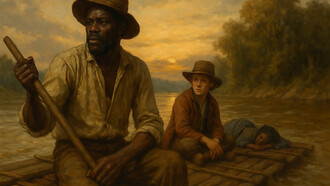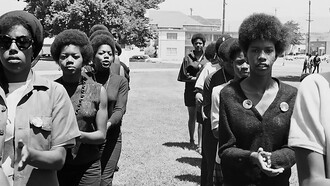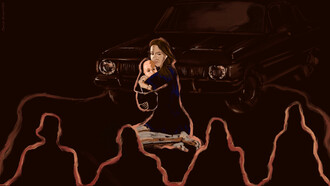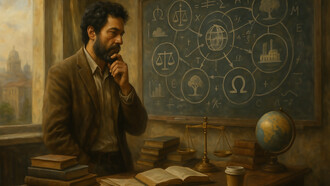It will have been 40 years ago, later this year, when the song Sun City came out: an inspiring response by over fifty musical performers to the racist apartheid regime in South Africa. That government had built a Bantustan (fake homeland) within its borders, called Bophuthatswana, where Sun City, a luxury resort and casino, became located. It offered gambling and topless shows otherwise banned in South Africa. It was a type of camouflage to make South Africa an appealing destination despite the fact that Black Africans within its borders were living under segregation, extreme poverty, police abuse and social oppression.
Gullible and probably greedy American and British performers started going there to do shows for huge amounts of money. Frank Sinatra allegedly played Sun City for between 1.5 and 2 million dollars for one night. The United Nations, which was trying to end the system of apartheid (racial segregation and denial of human rights to Black folks in South Africa), called for a cultural boycott and even created a register or list of performers who played Sun City. The list was meant to shame performers who played in one of the world’s most immoral and repressive societies and to deter others from playing.
Some later claimed that they did not know of the UN register. Surely, however, they must have heard about apartheid. Which is worse, choosing to make money from an oppressive government where people are openly suffering or being totally oblivious of the suffering of human beings?
Purely for historical and illustrative purposes, here are a few names of the more famous performers who chose to play Sun City while about 80% of the South African population was suffering from racial injustice: Elton John, Queen, Rod Stewart, Helen Reddy, The Beach Boys, Ray Charles, Chicago, Cher, Liberace, Tina Turner, Linda Ronstadt, Frank Sinatra, Curtis Mayfield, Olivia Newton-John. Linda Ronstadt was reported in the Chicago Tribune as saying, ''I don`t like being told I can't go somewhere.''
Folks seemed to be most shocked about the Queen. Everyone had thought they were a very cool band which would know better than to do something like this. In their defense, band members stated that they were a completely non-political band. Non-political means not affected by human suffering? Some folks are so driven by money so as not to see they are being paid to serve the interests of social evil?
Steven Van Zandt, of Bruce Springsteen’s E Street Band, was concerned about American support for the racist South African government. President Ronald Reagan seemed to have little or no interest in human rights abuses among potential economic and geopolitical allies. He has not been the only US president with this orientation. To cover himself he claimed that the US needed to engage in “constructive engagement” with South Africa: engage through dialogue and persuasion, rather than using economic sanctions.
The policy was, however, replaced by the Comprehensive Anti-Apartheid Act in 1986. The song Sun City in 1985 certainly must have contributed to public awareness and a public outcry against apartheid and "constructive engagement" with South Africa. The song's open contempt for the policy and its denunciation of playing at Sun City surely resonated around the world and helped to fuel and empower the anti-apartheid movement. This is despite the fact that half of the radio stations in the USA refused to play the song possibly due to its criticism of Reagan’s lack of an active policy. Their excuse was often, “Well, it is not pure rock, it is not pure rap, it’s a mixture of stuff so it just doesn’t fit our format.”
Van Zandt had traveled to South Africa to see the situation there himself and was disgusted with the racism and lack of opportunities or rights for Black Africans who had been segregated into fake homelands, to make it seem as if segregation were something natural or historical. He was so appalled that he didn’t want to just record a song that some folks would listen to on one of his albums. He wanted something big, something impactful. He was driven by the injustice of the situation, multiplied by the apathy of our government and the human suffering he had seen, to dream big of reaching millions with the truth.
To that end, Artists United Against Apartheid was formed in 1985, by Steven Van Zandt and record producer Arthur Baker. After Van Zandt finished writing Sun City, he, journalist Danny Schechter and producer Arthur Baker spent the next few months inviting performers to participate. They assembled over 50 performers including Bruce Springsteen, Peter Gabriel, Miles Davis, Bob Dylan, Run-DMC, Lou Reed, Bonnie Raitt, Bono, Grandmaster Melle Mel, Keith Richards, Jackson Browne, George Clinton, Kurtis Blow, Ringo Starr and Herbie Hancock.
At this time, nobody was apparently being shamed by the UN register. After the song, few dared to play Sun City. It took one guy to put his foot down and change all of this, influencing public opinion and American government policy. It was momentous. The Artists United Against Apartheid did not have to do what they did, but they took meaningful moral action anyway.
What blew critics away was the fact that the song was actually quite good. I’m no music critic, so I can’t analyze what the musicians did (you can easily find the song online), but the lyrics were bold, simple, strong and packed a huge moral punch. The performers sang that they were not going to play Sun City and pointed out: “Relocation to phony homelands / Separation of families I can't understand / 23 million can't vote because they're black / We're stabbing our brothers and sisters in the back.” About 80% of the South African population was Black and was not allowed to vote.
There was also a message for the US government and Ronald Reagan: “Our government tells us we're doing all we can / Constructive engagement is Ronald Reagan's plan / Meanwhile people are dying and giving up hope / Well this quiet diplomacy ain't nothing but a joke.” The song also reflected the sense of frustration many conscientious and progressive Americans have felt for a long time: “It's time to accept our responsibility / Freedom is a privilege nobody rides for free / Look around the world baby it cannot be denied / Some-somebody tell me why are we always on the wrong side.”
The song was not meant to make money, but it generated about $1 million for anti-apartheid causes regardless. More importantly, it was engaging millions of people on a meaningful level and those millions listening led to pressure on their government and other performers to do the right thing. Within 5 years, apartheid in South Africa started to be dismantled. Furthermore, this song proved there is hope. If we can get the truth out there, we can change everything. It’s just a question of getting the truth out there and folks listening among all the noise being made.
The phenomenon of a Sun City as a form of camouflage still exists in other incarnations, presenting dictatorships as welcoming countries on the global stage. In perhaps the most absurd case, North Korea began building itself up to be a tourist hub. Recall how Vladimir Putin began hosting important international sporting events like the 2014 Sochi Winter Olympics, the 2018 FIFA World Cup and the 2023 Commonwealth of Independent States (CIS) Games (held in Belarus, but with participation from Russia). Right now, Cambodia is a severely underdeveloped country where people often survive on $3 a day, but it now has some of the most luxurious casinos in the world to the glory of its dictator. You can do further research and find other examples, I am sure.
Dictators and corrupt societies still seem to think that people are gullible and won’t do their research or won’t even care. Let’s draw inspiration from Sun City and prove them wrong. Be responsible in regard to your tourism. Always look at the government and the conditions of the people behind the glitzy attractions. On a figurative level, you can also say, “I ain’t gonna play Sun City.”














